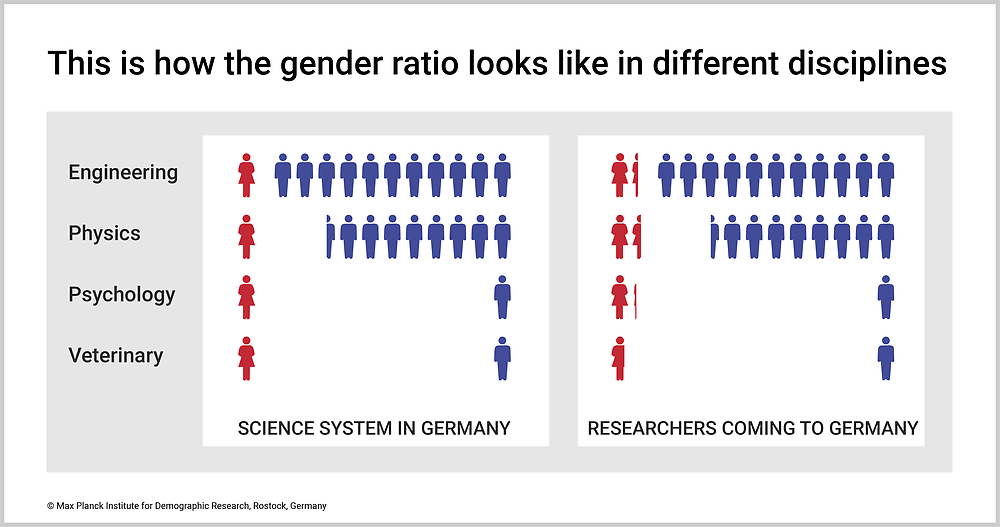July 27, 2021 | Press Release
Migration of Scientists: Who Moves to Germany? Who Leaves Germany?

In the German science system, substantial levels of gender disparities are observed among researchers. In contrast, the male-to-female ratio among researchers coming to Germany is lower and more balanced. © iStockphoto.com/gorodenkoff
A team including MPIDR researcher Xinyi Zhao analyzed migration flows of scientists moving to and from Germany using bibliometric data from over eight million publications from the online publication database Scopus. The strongest connections are found with the US, the UK, and Switzerland. In areas like Engineering and Physics, female scientists moving to Germany may help moderate extreme levels of gender disparities among scientists.
“We provide a comprehensive evaluation of the interplay between the migration of scientists and the number of citations across disciplines,” says Xinyi Zhao, PhD student at the Max Planck Institute for Demographic Research (MPIDR) in Rostock, Germany.
Along with research scientist Samin Aref, MPIDR director Emilio Zagheni, and external collaborator Guy Stecklov, they analyzed trends in international migration of scientists to and from Germany over the past 25 years.
The team relied on large-scale bibliometric data from over eight million publications which were published by over a million researchers and indexed in Scopus. The team assessed changes of institutional affiliations of the researchers who published with an affiliation in Germany at any point between 1996 and 2020.
Internationally mobile researchers provide a major contribution to the German Science System
During this period, roughly 14 percent of all researchers whose first publication had a German affiliation were internationally mobile. Conversely, this means that 86 percent of all researchers in Germany started their careers here and remained in Germany during the study period. But internationally mobile scientists have a disproportionately large contribution to the German science community in terms of publications produced and citations received.
While international scientists move to Germany, more published researchers left than have been attracted. “This is a sign of the impact of German science in the world. However, it also indicates that Germany has not reached its full potential in terms of attracting and retaining scholars in the global competition for talent”, says Emilio Zagheni.
According to the migration flows of published researchers from Scopus data, not only are the US, the UK, and Switzerland the countries of origins for most scientists moving to Germany, they are also the primary destinations for researchers leaving Germany. These three countries alone account for 58 percent of Germany’s total emigration of scientists.

In highly gender-imbalanced disciplines like Engineering and Physics, the male-to-female ratio among internationally mobile researchers is slightly more balanced than the one existing in Germany. © MPIDR
Download Figure (PNG File, 267 kB)
In the German Science System, substantial levels of gender disparities are observed among researchers. For example, in Engineering there are eleven male researchers for every female researcher. In Physics, the ratio of male researchers to female researchers is over eight.
In these highly gender-imbalanced disciplines, the male-to-female ratio among the internationally mobile researchers is lower and slightly more balanced. That means that a relatively more gender-balanced composition of Engineers or Physicists have moved to Germany than the existing gender ratio in Germany would suggest. “This indicates that international migration of researchers may help moderate some of the most extreme levels of gender disparities”, says Samin Aref.
The study was funded by the German Academic Exchange Service (DAAD) with funds from the Federal Ministry of Education and Research.
Original Publication
Zhao, X., Aref, S., Zagheni, E., Stecklov, G.: International Migration in Academia and Citation Performance: An Analysis of German-Affiliated Researchers by Gender and Discipline Using Scopus Publications 1996-2020. Proceedings of the 18th International Conference on Scientometrics and Informetrics (ISSI 2021). issi2021.org/proceedings/
Authors and Affiliations
Xinyi Zhao, Max Planck Institute for Demographic Research, Rostock
Samin Aref, Max Planck Institute for Demographic Research, Rostock
Emilio Zagheni, Max Planck Institute for Demographic Research, Rostock
Guy Stecklov, University of British Columbia